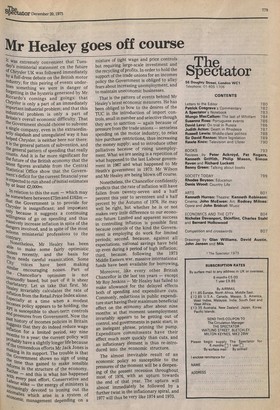Mr Healey goes off course It Was extremely convenient that
Tuesuays ministerial statement on the future of Chrysler UK was followed immediately by a full-dress debate on the British motor industry, for this pairing of events underlines something we were in danger of forgetting in the hysteria generated by Mr Riccardo's comings and goings: that ,ChrYsler is only a part of an immediately 'Portant industrial problem; and that this industrial problem is only a part of Britain's overall economic difficulty. That the Government should choose to subvent a single company, even in the extraordinarilY slapdash and unregulated way it has nelped Chrysler, is neither here nor there: it is the general pattern of subvention, and the general pattern of spending that really counts. And it is far more significant for the future of the British economy that the latest figures available from the Central Statistical Office show that the Governnient's deficit for the current financial year iS expected to run ahead of initial estimates oY at least £2,000m. In relation to this the sum -which may be somewhere between £75m and £162m that the Government is to provide for ChrYsler is insignificant; and impoittant "1Y because it suggests a continuing illingness of go on spending and thus aSSi•Yety increase inflation in spite of the `Langers involved, and in spite of the most solemn in contra/y inisterial professions to the Nonetheless, Mr Healey has been able to make some fairly optimistic , sn,clises recently, and the basis for needs careful examination. Some voices have been making Rnlilar encouraging noises. Part of "e • Chancellor's optimism is not unsoundly based, but part of it is sheer cliharlatanry. Let us take that first. Mr i„ealeY invariably calculates the rate of itflation from the Retail Price Index alone. i„sPeciallY at a time when a modest k'peoMes policy appears to be holding, the 1 is susceptible to short-terrn controls "no pressures from Government. Now the 13sast history of incomes policies in Britain 1_t1ggests that they do indeed reduce wage Loflation for a limited period, say nine _Incliths to a year; the current policy will 01",.robahly have a slightly longer life because n.ir the tremendous efforts Mr Jack Jones is th!kirt:ig in its support. The trouble is that "overnment shows no sign of using re'lfe time thus gained to make sensible R:hrnis in the structure of the economy. wit7,'er — and this is what has happened Lai; every past effort, Conservative and ine 'Lir alike — the energy of ministers is an,reasingly devoted to ironing out the eco'nlalies which arise in a system of "11* management depending on a mixture of tight wage and price controls but requiring large-scale investment and the recycling of profits. In order to hold the support of the trade unions for an incomes policy the Government is obliged to allay fears about increasing unemployment, and to maintain uneconomic businesses.
That is the pattern of events behind Mr Healey's latest economic measures. He has been obliged to bow to the desires of the TUC in the introduction of import controls, small in number and selective though. they are; to sanction — again because of pressure from the trade unions — senseless spending on the motor industry; to relax hire purchase restrictions, thus increasing the money supply; and to introduce other palliatives because of rising unemployment. What we are seeing is a repetition of what happened to the last Labour government in 1967 and what happened to Mr Heath's government in 1973: Mr Wilson and Mr Healey are being blown off course.
Nonetheless, the Chancellor confidently predicts that the rate of inflation will have fallen from twenty-seven and a half percent this year to seventeen and a half percent by the Autumn of 1976. He may well be right, but whether he is or not makes very little difference to our economic future. Limited and apparent success in controlling inflation is possible first because controls of the kind the Government is employing do work for limited periods; second, because, against all expectations, national savings have held up even during a period of high inflation; third, because, following the 1973 Middle Eastern war, massive international funds have been available for borrowing.
Moreover, like every other British Chancellor in the last ten years — except Mr Roy Jenkins — Mr Healey has failed to make allowance for the delayed effects both of spending and expenditure cuts. Commonly, reductions in public expenditure start having their maximum beneficial effect on the economy after about nine months: at that moment unemployment invariably appears to be getting out of control, and governments in panic start, in an inelegant phrase, priming the pump. Expenditure commitments have their effect much more quickly than cuts, and an inflationary element is thus re-introduced into the economic structure.
The almost inevitable result of an economic policy so susceptible to the pressures of the moment will be a deepening of the present recession throughout, most of 1976, with an upturn towards the end of that year. The upturn will almost immediately be followed by a • further twist in the inflationary spiral, and 1977 will thus be very like 1974 and 1975.


































 Previous page
Previous page